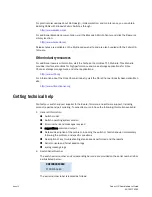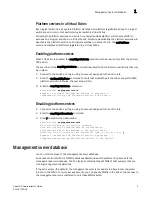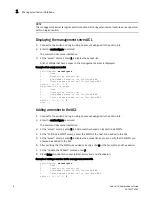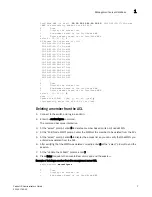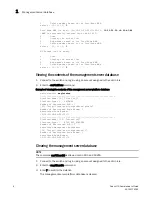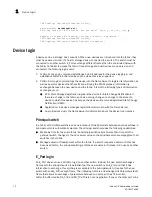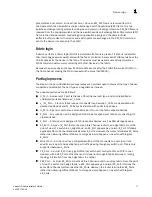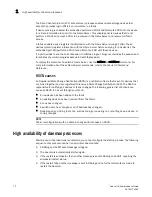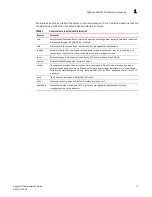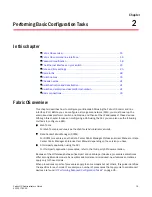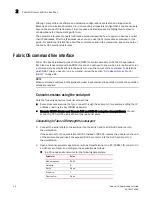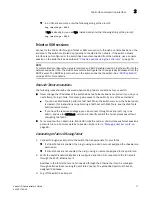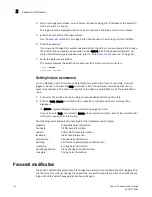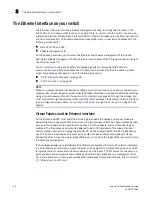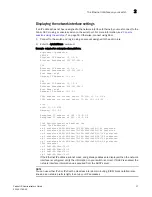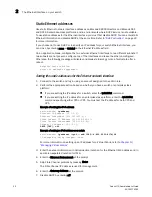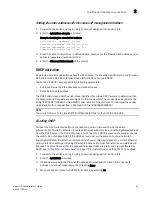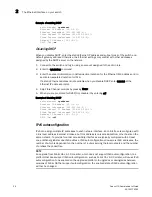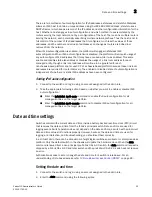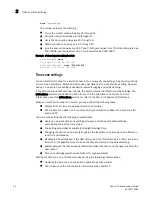
12
Fabric OS Administrator’s Guide
53-1001763-02
High availability of daemon processes
1
The Fibre Channel protocol (FCP) auto discovery process enables private storage devices that
accept the process login (PRLI) to communicate in a fabric.
If device probing is enabled, the embedded performs a PLOGI and attempts a PRLI into the device
to retrieve information to enter into the Name Server. This enables private devices that do not
perform a FLOGI, but accept a PRLI, to be entered in the Name Server and receive full fabric
access.
A fabric-capable device registers its information with the Name Server during a FLOGI. These
devices typically register information with the Name Server before querying for a device list. The
embedded port still performs a PLOGI and attempts a PRLI with these devices.
If a port decides to end the current session, it initiates a logout. A logout concludes the session and
terminates any work in progress associated with that session.
To display the contents of a switch’s Name Server, use the nsShow or nsAllShow command. For
more information about these Name Server commands, refer to the
Fabric OS Command
Reference
.
RSCN causes
An Registered State Change Notification (RSCN) is a notification frame that is sent to devices that
are zoned together and are registered to receive a State Change Notification (SCN). The RSCN is
responsible for notifying all devices of fabric changes. The following general list of actions can
cause an RSCN to be sent through your fabric:
•
A new device has been added to the fabric.
•
An existing device has been removed from the fabric.
•
A zone has changed.
•
A switch name has changed or an IP address has changed.
•
Nodes leaving or joining the fabric, such as zoning or powering on or shutting down a device, or
zoning changes.
NOTE
Fabric reconfigurations with no domain change will not cause an RSCN.
High availability of daemon processes
Starting non-critical daemons is automatic; you cannot configure the startup process. The following
sequence of events occurs when a non-critical daemon fails:
1. A RASlog and AUDIT event message is logged.
2. The daemon is automatically started again.
3. If the restart is successful, then another message is sent to RASlog and AUDIT, reporting the
successful restart status.
4. If the restart fails, another message is sent to RASlog and no further attempts are made to
restart the daemon.
Summary of Contents for 53-1001763-02
Page 1: ...53 1001763 02 13 September 2010 Fabric OS Administrator s Guide Supporting Fabric OS v6 4 0 ...
Page 4: ...iv Fabric OS Administrator s Guide 53 1001763 02 ...
Page 24: ...xxiv Fabric OS Administrator s Guide 53 1001763 02 ...
Page 28: ...xxviii Fabric OS Administrator s Guide 53 1001763 02 ...
Page 32: ...xxxii Fabric OS Administrator s Guide 53 1001763 02 ...
Page 40: ...xl Fabric OS Administrator s Guide 53 1001763 02 ...
Page 42: ...2 Fabric OS Administrator s Guide 53 1001763 02 ...
Page 54: ...14 Fabric OS Administrator s Guide 53 1001763 02 High availability of daemon processes 1 ...
Page 74: ...34 Fabric OS Administrator s Guide 53 1001763 02 Basic connections 2 ...
Page 102: ...62 Fabric OS Administrator s Guide 53 1001763 02 Audit log configuration 3 ...
Page 214: ...174 Fabric OS Administrator s Guide 53 1001763 02 Management interface security 7 ...
Page 228: ...188 Fabric OS Administrator s Guide 53 1001763 02 Brocade configuration form 8 ...
Page 276: ...236 Fabric OS Administrator s Guide 53 1001763 02 Creating a logical fabric using XISLs 10 ...
Page 404: ...364 Fabric OS Administrator s Guide 53 1001763 02 ...
Page 440: ...400 Fabric OS Administrator s Guide 53 1001763 02 Performance data collection 17 ...
Page 480: ...440 Fabric OS Administrator s Guide 53 1001763 02 F_Port masterless trunking 19 ...
Page 494: ...454 Fabric OS Administrator s Guide 53 1001763 02 Buffer credit recovery 20 ...
Page 574: ...534 Fabric OS Administrator s Guide 53 1001763 02 Hexadecimal overview E ...

